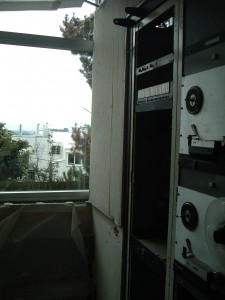Students who returned to their campuses this fall at University of San Francisco (USF), Vanderbilt University, Brown University, and Bryant University found, much to their surprise, that their FM radio stations have been taken off the air.
In the past year, there’s been an uptick in the number of colleges and universities that have opted to sell or lease their valuable FM signals to public radio groups. Although each station’s situation is unique; a common thread is that students are being asked to revamp and re-brand their stations as primarily online-only broadcasters. In response, many are protesting these moves, while others are quietly acquiescing.
As evidenced by the vocal opposition at Rice University’s KTRU, Vanderbilt University’s WRVU, and University of San Francisco’s KUSF; many college radio listeners and volunteers are devoted to FM and will not let their stations go down without a fight. On the flip side of this, Bryant University’s announcement that they would be allowing WGBH to use the WJMF airwaves to broadcast a classical channel into Rhode Island did not result in mass protests or outcry.
College radio is at a turning point. Supporters distressed by the pace of station sales are working hard to bring attention to recent college radio station losses in hopes of turning the tide and saving more stations from extinction. Yet school administrators, feeling the strain of the current economy, are tempted by the multimillion dollar offers coming in from public radio groups.
In the case of KUSF, protests began as soon as the FM signal was silenced without warning on January 18, 2011. Angry students and DJs stormed the offices of USF administrators and hundreds crowded into a packed meeting with the President of USF. A Save KUSF Facebook page and website were quickly created, rallies were held, and anti-KUSF sale resolutions were passed by San Francisco’s Board of Supervisors, the SF Democratic Party and by the USF Faculty Association. Numerous formal complaints were filed with the FCC regarding the pending station sale to Classical Public Radio Network (owned by University of Southern California and Public Radio Capital). Many have speculated that the issues raised in those complaints have both delayed the station sale and resulted in the FCC’s close scrutiny of the deal. In June 2011, the FCC issued a letter of inquiry, questioning many aspects of the pending sale and casting doubt over whether or not USF can lease out its non-commercial station’s airwaves in exchange for a monthly payment.
At WRVU it’s been a little over a year since news broke that Vanderbilt Student Communications (VSC) was contemplating a sell-off of the FM license. In advance of this September 2010 announcement, the URL “SaveWRVU” was purchased by a representative of VSC; which many saw as a pre-emptive strike to quell student protests. Although VSC sought input regarding the future of WRVU, on June 7 they announced plans to sell WRVU to Nashville Public Radio for use as a classical station (a day after students learned that the station’s call letters had been secretly changed). WRVU volunteers were locked out of the station later that day. Meanwhile, students, alumni, listeners, and musicians have spoken out about the sale and have even threatened to withhold donations to Vanderbilt and Nashville Public Radio.
President of WRVU Friends and Family Sharon Scott points out that WRVU was founded by students and has “been independently maintained by them ever since…with very little help or interference from the VSC or the Vanderbilt Administration.” Scott faults the non-profit VSC Board (comprised of Vanderbilt students and faculty, but no WRVU representatives) for voting to sell the FM frequency “despite the unanimous objection of the students and alumni of WRVU.”
In some cases these protests have resulted in backlash against station supporters. WRVU DJ Pete Wilson had hoped to volunteer at the new online-only WRVU this fall, but his application was rejected by the VSC. Wilson said that he believes that the VSC does not want him on the air because he’s been a vocal opponent of the station sale. According to Wilson, “I consider an online-only station to be a poor substitute for an FM station.”
Wilson’s point about the repercussions of speaking out may be part of the reason why some students, alumni, and faculty are keeping silent. Former KUSF DJ Chad Heimann is a senior at USF who has experienced some criticism for stating his views. He told me, “I’ve received a ton of pressure from USF Administration to not speak up.” In email exchanges with the President of USF he was told that he “was being carefully watched.” Despite that, Heimann continues to fight for the station and has been gratified to receive “a lot of support from faculty, students and staff.”
The situation couldn’t be more different at Bryant University in Smithfield, Rhode Island, where there’s been little to no public protest over changes at WJMF. Although some station alumni have expressed sadness about the move off FM, there’s no Save WJMF page or organized response. To the contrary, the current student staff is upbeat about the station’s future. WJMF’s General Manager Ricky McLaughlin did acknowledge that there is “somewhat of a mixed reaction” from returning students due to confusion about what happened to the station, with some students thinking the station was sold off. McLaughlin said that he sees “tangible benefits” from the relationship with WGBH and cited “increased wattage” on their new HD-2 channel, a “new outlet in DTV” and an opportunity to increase their online presence.
Although they did not have a license of their own, Brown Student Radio (BSR) at Brown University in Providence, Rhode Island also departed FM this summer. BSR leased airtime from WELH at The Wheeler School until their contract was terminated in August, leaving BSR without a terrestrial home. BSR’s Rock Director John McGarry pointed out that although FM wasn’t critical for many of the student DJs, it was vital to listeners. He said, “It grounded us as a local presence and added some variety to the FM band.” He reported that BSR has lost listeners as well as several programmers who say their audiences can’t listen online. McGarry said “tuning in online requires a bit more effort than just turning on a radio. We also lose the possibility of callers and listeners who randomly tune in— which I think will restrict our audience … to people who already know about us.”
As McGarry points out, independent, local FM radio reaches listeners in an entirely different way than online-only. While broadcasting has expanded to include newer technologies like streaming, iPhone applications, and HD; terrestrial radio clearly matters to stations of all stripes and is still one of the most widely consumed forms of media.
In 2011, college radio remains one of the few remaining outposts for local, independent radio and a number of efforts have been undertaken this year to help ensure its future. In February, fifteen radio stations from across the U.S. did a simultaneous live broadcast from San Francisco featuring KUSF DJs. In April, College Broadcasters Inc. organized a minute of radio silence to recognize the loss of KTRU from the FM dial. Several “Saving College Radio” panels have taken place at music and radio conferences, last week’s College Radio Day brought even more attention to the plight of college radio, and these discussions will continue when college radio DJs convene at the CMJ Music Marathon in New York City this week and the CBI (College Broadcasters, Inc.) fall convention in Orlando next week.




